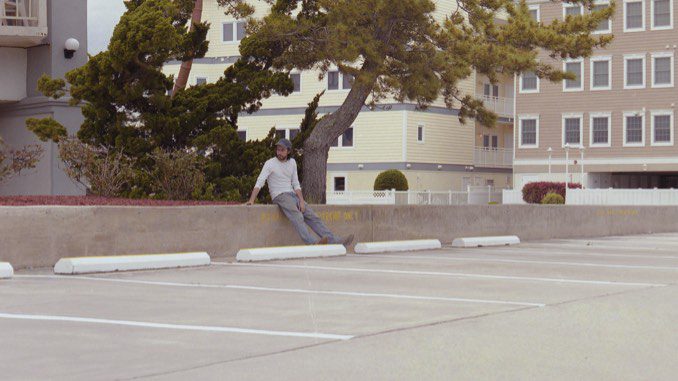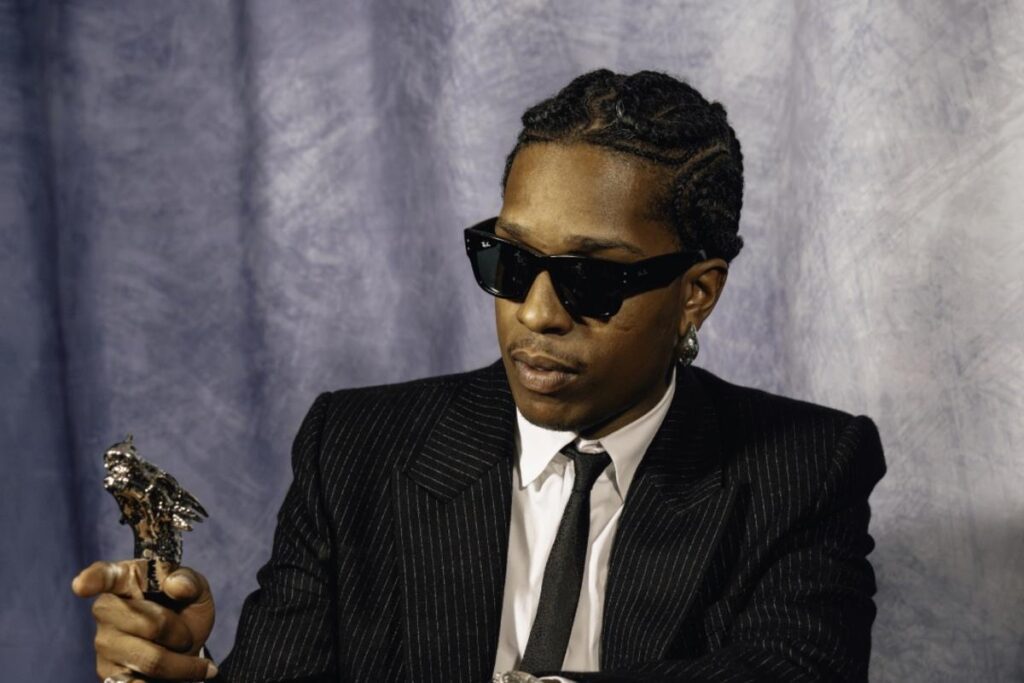There is a dreary sense of psychedelia that seeps from Alexander Giannascoli’s music, which is at once mesmerizing and deeply singular. Born and raised in the Philadelphia, Pennsylvania, suburbs, he started learning guitar and recording tracks after his parents bought him a laptop at age 11. This youthful spirit endures in his work, even as an adult—his vague lyrics frequently read a bit like the ramblings of an elementary schooler zonked on Nyquil. In high school, Giannascoli played gritty all-ages punk shows in bands like the modernist goth act MOTHER and the scrappy pop band The Skin Cells. This perfunctory attitude would go on to define his alluringly haphazard early solo work.
After enrolling at Temple University, Giannascoli started dropping music under the moniker Alex G. At this point, he was scattering a breadcrumb trail of slowcore lullabies and cryptic sonic oddities across the web. He released his unofficial debut, Race, as an unmastered upload to Bandcamp in 2011. From there, he continued to churn out murky albums, EPs and splits, when he wasn’t busy touring the East Coast. His bookish, but defiant disposition helped him maintain an air of lackadaisical cool, and he started to amass a following thanks to underground blogs and the adoration of more established musicians. Due to this growing momentum, he decided to drop out of college and pursue music full-time.
When Giannascoli finally put out his first official album, DSU, through Orchid Tapes in 2014, he was already one of the buzziest musicians active in the DIY sphere. Pitchfork initially compared him to Elliott Smith and Big Star, while The Fader touted him as “the Internet’s Secret Best Songwriter.” After Orchid Tapes also reissued the 2012 albums Rules and Trick, he had the cultural cachet it took to sign with legendary imprint Domino. With the backing of the indie stalwart, Alex G released his grayscale 2015 record Beach Music and, shortly thereafter, collaborated with Frank Ocean on his acclaimed sophomore album Blonde. 2017’s Rocket and 2019’s House of Sugar are viewed as some of the most important albums of the last decade. Both found Giannascoli evolving from a bedroom-rock favorite to something more akin to a modern, understated version of a Bruce Springsteen or Tom Petty figure.
At just 29 years old, Giannascoli is one of the most beloved alternative musicians to emerge in recent memory. So ahead of his soundtrack to the forthcoming Jane Schoenbrun film We’re All Going to the World’s Fair, we’re looking back at the 10 best Alex G songs so far, from overlooked rarities to his iconic singles.
10. “Fay“
There is a distinctly Northern uneasiness to Alex G’s music, which the hard-to-find track “Fay” captures particularly well. Uploaded to YouTube in 2018, the song is sung from the perspective of someone who seems simultaneously problematic and reserved. “Here they come knocking at my door / Wee-oo-wee-oo-wee-oo / What’s the problem officer / What you knocking for?” Giannascoli repeats over a stuttering drum groove and blocky electric guitar chords. Frigid and sullen, it’s one of the wintriest pieces of music he’s ever made.
9. “Sorry”
The Alex G universe has a frolicsome, verdant side, but Giannascoli also has a musical dark edge. “Sorry” seems to tell the story of a disconcerting drug deal—a startling portrait of crime and regret. “I’ll get my cure / Wait in the car / I won’t remember / Who you are,” Giannascoli sings a number of times over the course of the sub-three-minute song. It can be difficult to parse when he’s pulling from personal experience and when global trends inform his aloof verse. Regardless, “Sorry” is one of the most brilliant examples of his penchant for tragedy.
8. “Gretel”
Manipulated and glitchy, the hook from “Gretel” would make a phenomenal sample in an emo-rap track. The House Of Sugar single pairs a half-time groove with ominous lyrics (“Did they bury me here? / Daddy, don’t let ‘em put me down / Daddy, don’t let ‘em turn me around”) that never quite make sense, but nonetheless evoke an eerie dread. Named after the Sugarhouse Casino in Philly, Giannascoli’s seventh record grapples with themes of addiction, capitalism and discomfort. “Gretel” perfectly encapsulates that album’s knack for oblique storytelling.
7. “Sandy”
Giannascoli often writes from the perspectives of young people, but his preoccupation with adolescence is rarely as overt as it is on “Sandy.” “My name is Sandy, I’m 14 years old / My friends say I’m ugly / But my dad says I’m the prettiest thing,” he sings, before touching on Satanism and anxiety-provoked illness. Although we get little context for who Sandy’s character actually is, it isn’t hard to imagine them as some endearing, but troubled figure, like Donnie Darko or Edward Scissorhands. The feverish musings of an auto-fictitious teen make this one of the most treasured tracks in the Alex G catalog.
6. “Water”
Although Giannascoli tends to be praised for his verbosity, the simpler output is just as captivating as his postmodern world-building. “Water” is about as toned down as it gets. “Water’s all I need / Now I can go back to sleep,” he repeats for two minutes over mathy plucking. Although it’s certainly straightforward, the Rules opening track calls to mind the unsettling, but grounding moments after you wake up from a nightmare in the wee hours of the morning.
5. “Sportstar”
At times, Alex G’s verse can feel like Don Delillo’s. At others, it’s more reminiscent of the screenplay for Stranger Things. “Sportstar” falls into the latter camp. At first glance, it’s a love song about high school extracurriculars, but upon further examination, its exploration of romantic power dynamics is profound, the narrator’s implied age notwithstanding. “Let me tie your Nikes / Holding on for sportstar / Let me wear your jersey / If you want to hurt me / Hurt me,” Giannascoli’s AutoTuned voice sings. It’s easy to get lost reading in between the lines of this song’s penmanship, but its swirling, piano-led instrumental is just as powerful as its vocals.
4. “Treehouse”
At this point, “Treehouse” is one of Alex G’s top-streamed songs on Spotify, but for a long time, it was just an obscure YouTube upload nestled among his dense graveyard of unreleased tunes. The Emily Yacina collab is youthful and sentimental, alluding to an innocent, childlike friendship. “‘Do Not Enter’ is written on the doorway / Why can’t everyone just go away? / Except you / You can stay,” Yacina sings, before talking about how she usually sits in her wooden clubhouse alone. There’s no shortage of Alex G tracks that capture the essence of sepia-tinted suburban nostalgia, but this one is so sweet, it’s almost tearjerking.
3. “Hope”
Centered on juxtaposition, “Hope” uses a chipper folk instrumental to support lyrics that pay tribute to a friend who overdosed. A galloping shuffle, propelled by acoustic guitar and organ, provides the backdrop for lyrics about the opioid epidemic’s grip on West Philly. “He was a good friend of mine / He died / Why I write about it now? / Gotta honor him somehow / Saw some people crying that night / Yeah, Fentanyl took a few lives from our life,” Giannascoli sings in the first verse. Alex G’s songwriting tends to be intangible, so this heart-wrenching and direct track is one of the most humanizing cuts in his whole discography.
2. “Powerful Man”
There is a timelessness to Alex G’s music that dwells in the same vein as the work of a great American songwriters like John Prine or Woody Guthrie. “Powerful Man” feels like it could have emerged from any decade over the last century, thanks to its whimsical, humorous lyrics about family, drama and forgiveness. Over the course of three verses, he ties together bizarre vignettes about forgiving a brother, laughing about a baby biting someone, and daydreaming about roaming God’s country with a gun in hand. As a whole, Rocket is Alex G’s most country-indebted album. This song has an especially rural, mind-bending energy.
1. “Forever”
With its gloomy, organic arrangement and simplistic, catchy lyricism, “Forever” is, in many ways, the quintessential Philly indie song. Alex G played a big role in putting the Mid-Atlantic underground rock mecca on the map, and it’s easy to pinpoint his influence on a number of local peers—you can hear traces of this track in music by acts like Blue Smiley, Strange Ranger, Shelf Life and others. “Burns in the sun / Lives for no one / Salt on your tongue / Lights out, no fun,” he intones in a cartoonishly chirpy style over leaden acoustic strumming and a shuffling, tom-driven drum groove. At once stoic and guileless, it showcases the complex dichotomy of Alex G’s art at its finest.
Ted Davis is a culture writer, editor and musician from Northern Virginia, currently based in Los Angeles. He is the Music Editor for Merry-Go-Round Magazine. On top of Paste, his work has appeared in Pitchfork, FLOOD Magazine, Aquarium Drunkard, The Alternative, Post-Trash, and a slew of other podcasts, local blogs and zines. You can find Ted on Twitter at @tddvsss.
Revisit Alex G’s 2014 Daytrotter session below.




